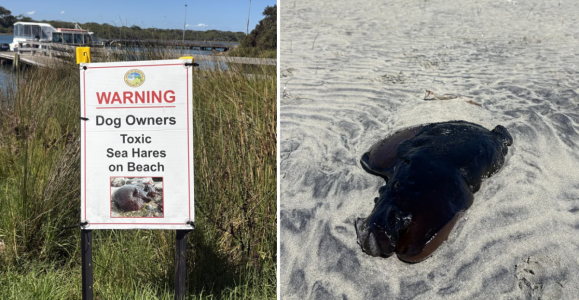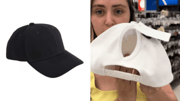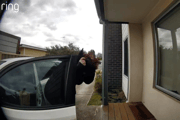Deadly creatures invade popular beach town—what you must know to stay safe
By
Gian T
- Replies 0
Australia’s coastlines are known for their beauty and diverse wildlife, but not every encounter is safe.
A concerning situation has emerged in a well-frequented bay, prompting an urgent warning for locals and visitors.
Authorities are urging caution as conditions along the shoreline become increasingly risky.
In the picturesque town of Augusta, located in Western Australia, many toxic sea creatures known as sea hares have been found washed ashore.
The Hardy Inlet, particularly near Flinders Bay, has become littered with these potentially lethal animals, causing alarm among local authorities and the community.
The Shire of Augusta Margaret River Council has proactively alerted the public to the dangers these seemingly innocuous marine animals pose.
With estimates ranging from 300 to 700 dead sea hares discovered along the lower parts of the Inlet, including Jays Beach—a popular spot for dog walking—the council has emphasised the severity of the threat.
Sea hares, native to Australian waters, can be incredibly toxic.
Their defence mechanisms include the release of purple ink and toxic chemicals designed to deter predators.
Unfortunately, if ingested, these same substances can have devastating effects on domestic pets, particularly dogs.
The council has reported that exposure to sea hares can lead to seizures, vomiting, and, in the worst cases, death for our canine companions.
Given the gravity of the situation, the council has advised pet owners to exercise extreme caution.
They recommend keeping dogs on a leash near the shoreline and supervising them closely to prevent contact with the washed-up sea hares or their toxic residue.
Dr Tim Hopkins, a veterinarian specialising in toxins, spoke about the risks associated with these events.
'You'll see immediate symptoms from them having mouthed the sea hare, and then usually within hours, you're seeing those systemic signs,' he said.
'It's often hard with these inquisitive dogs; they'll find a random washed-up item or animal, and we do see that [poisonings] sometimes after mass beaching events with jellyfish and other venomous animals.'
Hopkins also advised that while owners can attempt to rinse their dogs' mouths if they come into contact with a sea hare, this should not delay seeking professional medical help.
The phenomenon of sea hares washing ashore is not entirely new to the area.
'Sea hares have washed ashore before in the Hardy Inlet — this seems to be a regular event that often occurs in late summer,' the council said.
'It is believed that the cause is related to weather conditions, particularly strong south-easterly winds, that have coincided with life cycle behaviours of the sea hares, where they have washed onto the beach and died.'
Strong south-easterly winds and environmental factors like warm temperatures and increased algal blooms are thought to contribute to these mass beachings.
For pet owners, the message is clear: vigilance is key. While enjoying Australia's stunning coastlines, it's essential to know the potential dangers accompanying natural events.
Keeping pets safe means staying informed about local wildlife occurrences and knowing the location of the nearest emergency vet.
Australia's diverse ecosystem is both a wonder and a challenge to navigate.
As we appreciate our environment's unique and sometimes bizarre aspects, let's also remember to protect our beloved pets from their hidden perils.
If you're a pet owner or love to stroll along the beach, watch for any unusual wildlife activity and heed the warnings issued by local authorities.
 Have you or your pets had any close encounters with Australia's wildlife? Share your experiences and tips for staying safe in the comments below.
Have you or your pets had any close encounters with Australia's wildlife? Share your experiences and tips for staying safe in the comments below.
A concerning situation has emerged in a well-frequented bay, prompting an urgent warning for locals and visitors.
Authorities are urging caution as conditions along the shoreline become increasingly risky.
In the picturesque town of Augusta, located in Western Australia, many toxic sea creatures known as sea hares have been found washed ashore.
The Hardy Inlet, particularly near Flinders Bay, has become littered with these potentially lethal animals, causing alarm among local authorities and the community.
The Shire of Augusta Margaret River Council has proactively alerted the public to the dangers these seemingly innocuous marine animals pose.
With estimates ranging from 300 to 700 dead sea hares discovered along the lower parts of the Inlet, including Jays Beach—a popular spot for dog walking—the council has emphasised the severity of the threat.
Sea hares, native to Australian waters, can be incredibly toxic.
Their defence mechanisms include the release of purple ink and toxic chemicals designed to deter predators.
Unfortunately, if ingested, these same substances can have devastating effects on domestic pets, particularly dogs.
The council has reported that exposure to sea hares can lead to seizures, vomiting, and, in the worst cases, death for our canine companions.
Given the gravity of the situation, the council has advised pet owners to exercise extreme caution.
They recommend keeping dogs on a leash near the shoreline and supervising them closely to prevent contact with the washed-up sea hares or their toxic residue.
Dr Tim Hopkins, a veterinarian specialising in toxins, spoke about the risks associated with these events.
'You'll see immediate symptoms from them having mouthed the sea hare, and then usually within hours, you're seeing those systemic signs,' he said.
'It's often hard with these inquisitive dogs; they'll find a random washed-up item or animal, and we do see that [poisonings] sometimes after mass beaching events with jellyfish and other venomous animals.'
Hopkins also advised that while owners can attempt to rinse their dogs' mouths if they come into contact with a sea hare, this should not delay seeking professional medical help.
The phenomenon of sea hares washing ashore is not entirely new to the area.
'Sea hares have washed ashore before in the Hardy Inlet — this seems to be a regular event that often occurs in late summer,' the council said.
'It is believed that the cause is related to weather conditions, particularly strong south-easterly winds, that have coincided with life cycle behaviours of the sea hares, where they have washed onto the beach and died.'
Strong south-easterly winds and environmental factors like warm temperatures and increased algal blooms are thought to contribute to these mass beachings.
For pet owners, the message is clear: vigilance is key. While enjoying Australia's stunning coastlines, it's essential to know the potential dangers accompanying natural events.
Keeping pets safe means staying informed about local wildlife occurrences and knowing the location of the nearest emergency vet.
Australia's diverse ecosystem is both a wonder and a challenge to navigate.
As we appreciate our environment's unique and sometimes bizarre aspects, let's also remember to protect our beloved pets from their hidden perils.
If you're a pet owner or love to stroll along the beach, watch for any unusual wildlife activity and heed the warnings issued by local authorities.
Key Takeaways
- Pet owners are warned about the dangers of toxic sea hares that have washed ashore at Hardy Inlet, which can be lethal if ingested by dogs.
- Authorities have urged the public to keep dogs on a leash around affected areas to prevent them from coming into contact with dead marine life.
- Symptoms of sea hare toxin exposure in dogs can include vomiting, seizures, and even death; seeking immediate veterinary attention is crucial.
- This incident of sea hares washing ashore is not unprecedented and may be attributed to environmental factors such as weather conditions and their life cycle behaviours.








